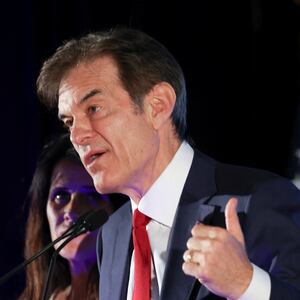Pay Dirt is a weekly foray into the pigpen of political funding. Subscribe here to get it in your inbox every Thursday.
If one thing was clear from Connecticut hedge fund manager David McCormick’s brief run during the 2022 Pennsylvania Republican Senate primary, it’s that his campaign had a practically bottomless built-in fundraising base—in the form of the candidate himself.
But while McCormick, who boasts a net worth in the hundreds of millions, likely won’t have trouble scrounging up the cash for his newly minted 2024 Senate bid, his financial maneuvering this time around has already drawn scrutiny among legal experts. And those experts told The Daily Beast that McCormick appears to be testing the limits of “testing the waters”—exploiting a loophole in campaign finance law to build out his operation while keeping those moves off the books.
Since March, McCormick has quietly operated a state-level PAC in Pennsylvania, called “Pennsylvania Rising.” But The Daily Beast’s review of the PAC’s disclosures, together with a raft of reporting on McCormick’s backstage moves over that same timeline, suggest that the investment manager may have dual purposes in mind.
McCormick, husband of former Donald Trump administration official Dina Powell—and until 2022 the head of the world’s largest hedge fund, Bridgewater Associates—is one of the GOP’s top 2024 recruits. He’s also likely the Republican Party’s best bet to unseat longtime Democratic incumbent Sen. Bob Casey. In 2022, McCormick conceded the GOP primary in a nailbiter to fellow wealthy non-Pennsylvanian Dr. Mehmet Oz, but for the last several months, he’s been setting the stage for a second act.
In six months, Pennsylvania Rising has managed to raise roughly $1.2 million—in an off-election year for the state. That includes a $1 million contribution in June from the state’s wealthiest denizen, GOP megadonor Jeff Yass. At the same time, the PAC has put most of that money not towards its stated purpose of boosting state GOP candidates, but to firms and consultants who either worked for McCormick’s 2022 campaign or have joined his current operation.
McCormick appears to be “flagrantly bending the rules,” according to Dan Weiner, a former Federal Election Commission attorney and current director of elections and government at the Brennan Center for Justice.
“This is ostensibly a state PAC that seems more obviously like a federal PAC,” Weiner said. “These are the sort of moves that have become common, the creative allocation of money. But if you’re assembling an entire apparatus, there’s no way to square that with saying you’re not sure you’re running.”
Candidates considering a campaign for federal office may enjoy a “testing the waters” grace period, where they can raise and spend money for services that help inform their decision. But if a candidate does opt to run, they must retroactively disclose that financial activity—and it must comply with the rules that apply to any federal campaign.
This grace period was once a rarity, Weiner explained, “a narrow carve-out for candidates who truly aren’t sure they want to run.” But more and more candidates—like Trump and Ron DeSantis—have been treating it as a black box, he said, “as a way to forestall disclosure and undermine campaign transparency, a fundamental building block of campaign finance law, and it has far outstripped anything it was originally supposed to be—a long-term shadow campaign you run until you decide on your own timeline when you want to make it official.”
“It’s a culture of impunity, and that’s the kind of thinking that gets you to a place where a sitting member of Congress is charged with stealing a donor’s credit card,” Weiner said.
McCormick’s official declaration this month didn’t amount to much more than a formal nod to what supporters and observers had long considered a fait accompli. Reporting from as early as January has made clear that McCormick has been overtly “testing the waters” for quite some time, with one Philadelphia Republican Party official even landing on that very metaphor this summer.
“I was told he stuck his toe in the Atlantic Ocean and the temperature’s not where he needs it to be right now,” the official told The Philadelphia Inquirer in August. The same outlet reported that GOP insiders confided in January that McCormick had already begun “interviewing media firms for a potential campaign.”
Pennsylvania Rising, however, is a glaring flag.
The group, which McCormick created in March, spent more than $700,000 in the months and weeks leading up to McCormick’s formal Oct. 1 candidacy declaration, according to The Daily Beast’s review of state filings. But most of that money—more than $400,000—went to consultants, firms, and officials who also happened to work for McCormick, either in 2022 or now. That includes his current campaign spokesperson, Elizabeth Gregory, who doubles as the spokesperson for Pennsylvania Rising and has received around $55,000 for that work.
Gregory did not return The Daily Beast’s detailed request for comment.
One consulting firm, ColdSpark, openly touted its work on McCormick’s 2024 campaign launch in an email last month, which was reviewed by The Daily Beast.
“Here’s a glimpse into all the hard work and professional craftsmanship that went into making the launch of one of the most important U.S. Senate races in the country a huge success,” the email said.
The spending also doesn’t appear to square with the mission statement on the PAC’s website.
“Pennsylvania Rising is fighting to protect our conservative values by supporting Republican candidates running for state office in Pennsylvania,” the statement says. “We will take on the challenges facing Pennsylvania Republicans and serve as an avenue to address important issues including vote-by-mail and voter registration disparities.”
While Pennsylvania Rising has paid more than $400,000 to known McCormick hires, it has only contributed a quarter of that amount to candidates and committees. Pennsylvania held most of its statewide elections last year, leaving an extremely narrow group of judicial and special legislative elections, most of which were over in May.
Additionally, the PAC’s expenses to popular GOP fundraising firm Targeted Victory—another McCormick hire from 2022—have already run well over $200,000, cannibalizing the PAC’s total small-dollar fundraising and eclipsing its political contributions.
In all, the activity raises the specter of a low-profile shadow operation to help McCormick get a jump on his all-but-inevitable plunge into 2024. And that activity, experts said, pushes and might even exceed the limits of the law.
Saurav Ghosh, director of federal reform at nonprofit advocacy group Campaign Legal Center, reviewed Pennsylvania Rising’s filings, telling The Daily Beast that McCormick “will need to answer” for the group’s activity.
“The idea of using a state PAC that’s stated purpose is to advance other GOP candidates in Pennsylvania is, just by following the money, clearly not the majority of what it’s doing,” Ghosh said. “The majority of its money is being spent on consultants and other strategists, and that’s an important question that he will need to answer.”
Because McCormick filed his candidacy the day after the third quarter reporting period ended, any possible “testing the waters” campaign activity won’t be disclosed until the next round of reports are due in January. And while Ghosh allowed that it’s possible that McCormick might eventually reveal that this PAC conducted some of that exploratory work, one major fact would appear to take that off the table.
That would be the group’s fundraising. Pennsylvania allows unlimited individual political donations at the state level, as reflected in Yass’ $1 million gift to the PAC. But that contribution alone would make almost all the PAC’s current funds off-limits for federal campaign activity, according to Paul S. Ryan, an expert in campaign finance law and deputy executive director at the Funders’ Committee for Civic Participation.
“Any entity directly or indirectly established by a federal candidate must comply with the federal ban on ‘soft money,’” Ryan told The Daily Beast, noting that the individual donor cap for a primary campaign is $3,300. “A single donor cannot give $1 million to a federal candidate.”
But while the PAC has burned through most of Yass’ money, as of Sept. 18, it still sat on about $450,000. That fact, Ryan said, conjures the recent memory of DeSantis, whose presidential efforts got a controversial multimillion-dollar boost from his state-level PAC—and drew a federal complaint from Campaign Legal Center.
“McCormick’s the creator of the state-level PAC, so that should be dispositive that the money should not be used in his federal election campaign,” Ryan said, saying that such a move would be “flatly illegal.”
However, it’s possible that McCormick could try the move that the DeSantis team made, when his state PAC contributed more than $80 million to a super PAC.
“It’s not a legal maneuver, but one that he might try to get away with, because the Federal Election Commission hasn’t enforced those rules,” Ryan said.
McCormick’s campaign might not expressly need the money—he put more than $14 million of his own funds into his five-month sprint in that year’s primary. (His team also reportedly launched a super PAC months ago, using it like DeSantis to build political infrastructure.)
But the PAC offers other advantages that could benefit a Senate bid, such as underwriting polling, research, and strategic consulting services.
To that point, disclaimers on both the PAC’s website and its donation landing page reveal that McCormick has been using the group to acquire a personal list of supporters and potential donors. Those disclaimers tell supporters that, by entering their personal information, they agree to receive emails, text messages, and phone calls—including automated calls—not just from Pennsylvania Rising, but also from “Dave McCormick.” McCormick can tap this PAC asset as a federal candidate, though he would be required to report the list as an in-kind contribution to his campaign.
Notably, the PAC started raising money immediately from small-dollar donors across the country. Its first financial filing revealed donors from Florida, Texas, Tennessee, California, Virginia, South Carolina, Michigan, and Oregon going neck and neck with its home-state support.
Ghosh said it’s possible the PAC is double-dipping, “both testing the waters for McCormick and helping other Republicans.”
“That’s not unlikely or improbable, but we would still need to know if that’s happening,” he said.
Of course, McCormick already had a federal campaign. In fact, he now has two of them, launching a new campaign committee called “Friends of Dave McCormick” before terminating his 2022 vehicle, “Dave McCormick for U.S. Senate.”
It’s unclear why McCormick created a parallel group, rather than re-engaging his existing campaign. However, in recent weeks his 2022 committee was hit with a number of FEC notices, including for reports from last year. The notices have flagged an array of apparent errors and violations, including excessive contributions and improperly reported debt.
The debts include not just the $14.4 million in loans that McCormick never recouped, but another $407,000 still owed to two prominent Republican consulting firms for work from 2022. Until the campaign committee reconciles those debts, however, it cannot shut down. It has $7,266.82 in the bank.









